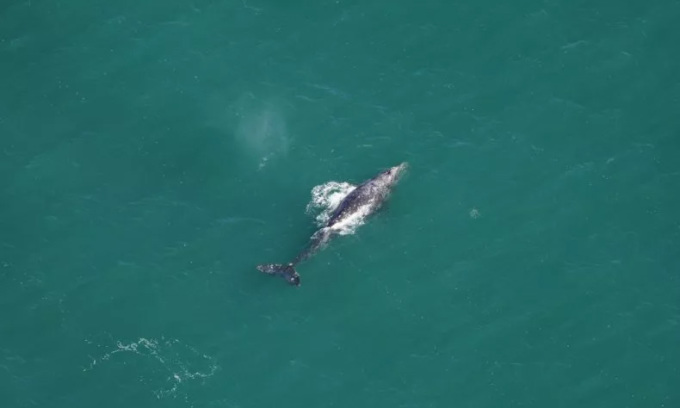Gray whales, a species thought to have been extinct in the Atlantic Ocean since the 1700s, have suddenly appeared near Nantucket Island, Massachusetts, USA.

Gray whales swim in the waters near Nantucket Island, Atlantic Ocean, on March 1. Photo: New England Aquarium
Although they thrive in the Pacific, gray whales have been absent from the Atlantic since the 1700s. However, an aerial survey team from the New England Aquarium spotted a gray whale on March 1 near Nantucket Island, Massachusetts, and photographed it repeatedly diving and surfacing, Newsweek reported on March 5. The aquarium said it is possible that the gray whale was also spotted in Florida late last year.
Climate change may be the reason gray whales are showing signs of returning to the Atlantic. The whale on March 1 may have passed through the Northwest Passage, a route through the Arctic Ocean that connects the Pacific and Atlantic Oceans. Global warming has left the Northwest Passage ice-free in the summer, providing a free passage for gray whales to swim into the Atlantic.
"The new discovery highlights the importance of surveys. We expected to see humpbacks, right whales, fin whales, but the ocean is a dynamic ecosystem and you never know what you're going to find. The presence of gray whales in the Atlantic shows how quickly marine species can respond to climate change when given the opportunity," said Orla O'Brien, a scientist at the Anderson Cabot Center for Marine Life at the New England Aquarium.
Warming ocean waters have climate experts worried about a number of issues, including stronger storms, coral reef damage and melting sea ice. Climate change is also having a significant impact on whales other than gray whales. For example, the North Atlantic right whale, which is listed as critically endangered on the International Union for Conservation of Nature (IUCN) Red List, is getting smaller as a warming climate makes food scarcer.
Thu Thao (According to Newsweek )
Source link



![[Photo] Looking back at the impressive moments of the Vietnamese rescue team in Myanmar](https://vstatic.vietnam.vn/vietnam/resource/IMAGE/2025/4/11/5623ca902a934e19b604c718265249d0)
![[Photo] "Beauties" participate in the parade rehearsal at Bien Hoa airport](https://vstatic.vietnam.vn/vietnam/resource/IMAGE/2025/4/11/155502af3384431e918de0e2e585d13a)



























![[Photo] Summary of parade practice in preparation for the April 30th celebration](https://vstatic.vietnam.vn/vietnam/resource/IMAGE/2025/4/11/78cfee0f2cc045b387ff1a4362b5950f)



























































Comment (0)